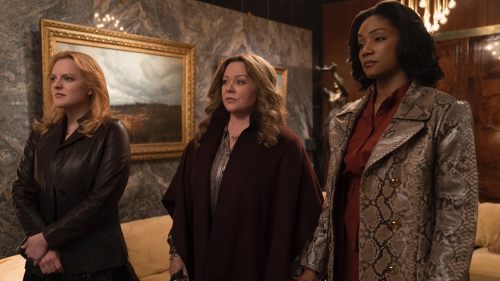CAN YOU EVER FORGIVE ME Review: A Convincing Imitation Of Life
It’s a cutthroat world, the world of writing. It's something nearly anyone can do, few can do well, and even fewer can truly succeed in; in addition to talent, it requires self-promotion, attention to popular trends, and a willingness to schlep through a ton of work for often little reward. Most of all, writing also requires personal skills like empathy, self-awareness, and emotional openness.
The writer's struggle between the professional and personal is the bitter beating heart of Marielle Heller’s quietly devastating Can You Ever Forgive Me? - a film whose story will entertain many, but which will truly resonate with creatives (and before I continue, I’ll happily cop to bias here).
Can You Ever Forgive Me? tells the true story of author Lee Israel (Melissa McCarthy), who, stuck in a tight financial spot in 1991, turned to forging letters by famous literary figures to make ends meet. Disguising her caustic personality behind those of her subjects, Israel managed to convince even experts that her writing was that of Noel Coward, Marlene Dietrich, Dorothy Parker, and others. She sold over 400 forged letters, some alongside fence, miscreant, and friend Jack Hock, before the FBI eventually caught up with her. After doing her time via house arrest and probation, Israel turned her story into a book - and now, a few years after her death, it’s a movie.
Suffice it to say, this alcoholic cat lady’s Catch Me If You Can is a hell of a story. But that’s only the half of it; there’s much more going on underneath the surface.
Much attention has been lavished upon Melissa McCarthy’s performance as Israel, and all of it is deserved. McCarthy delivers not just her finest work as an actor, but a performance that could, and should, redefine how audiences (and casting agents) see her. Walking a particularly difficult performance tightrope, McCarthy portrays Israel as emotionally closed-off while also letting the audience in. Israel spends a good half the movie drunk, but McCarthy and Heller don't draw attention to it often. Her alcoholism sits quietly in the background, informing McCarthy’s performance at all times - a more complete portrayal of the disease than any number of drunken rampages. It makes McCarthy’s emotional delivery that little bit more raw and unfiltered; her bottomless well of self-loathing all the more palpable. And still, McCarthy wrings considerable laughter out of Nicole Holofcener and Jeff Whitty’s script. It’s a remarkable feat from an often undervalued performer.
Playing against McCarthy’s slumping, resigned misery, Richard E. Grant plays a down-and-out loser with a different attitude: wild, flamboyant abandon, all sparkling eyes and exaggerated posturing. Given that he’s playing a promiscuous gay character in early-‘90s Manhattan, Grant ends up dealing with dark dramatic material later in the film, but brings his character’s carefree facade to bear on that, too. The man is a delight to watch, his character a blend of giggling shenanigans and hidden darkness. His presence (and copious alcohol intake) almost makes Can You Ever Forgive Me? a sort of spiritual sequel to Withnail and I.
Heller shapes these performances and her film with all the attention to emotional detail one would expect after Diary of a Teenage Girl. Depicting not just the difficulty of the writing process, but the self-hatred developed when that process doesn’t go well, is hard to do without resorting to melodrama, but Heller’s subtle direction nails it. When the story picks up, her editing becomes swifter, almost turning the film into a crime caper, but Heller never loses sight of her central character’s personal and professional struggles.
Holofcener and Whitty’s script is smart, too, in its marriage of Israel’s professional and personal lives. Israel is incapable of holding down relationships due to trust issues, never opening up emotionally to anyone except her 12-year-old cat - so it makes sense that her specialty is hiding behind other people’s names. There’s something truly tragic about Israel, possessed of an uncanny ability to understand and feel others' emotions, yet incapable of expressing her own. When Israel finally swallows the unpleasant pill of actually writing about herself (specifically, the book that inspired this film), her fear of vulnerability burns bright behind McCarthy’s eyes.
An emotional story about wilfully unemotional people, Can You Ever Forgive Me? may as well have been custom-made to pull all my emotional strings. It skewers the pretension of the writing trade, illustrating the fact that many writers, if not most, are simply trying to earn a living. McCarthy plays her “horrid cunt” of a character with wit and compassion, matched by a terrific supporting cast. There’s even cat-related drama, which is almost a Pavlovian trigger for me. But the film’s greatest strength also Heller's: digging underneath a character’s plot to find their story. She’s two for two at this point; her next film, You Are My Friend, stars Tom Hanks as Fred Rogers. Bring it on, Marielle.



